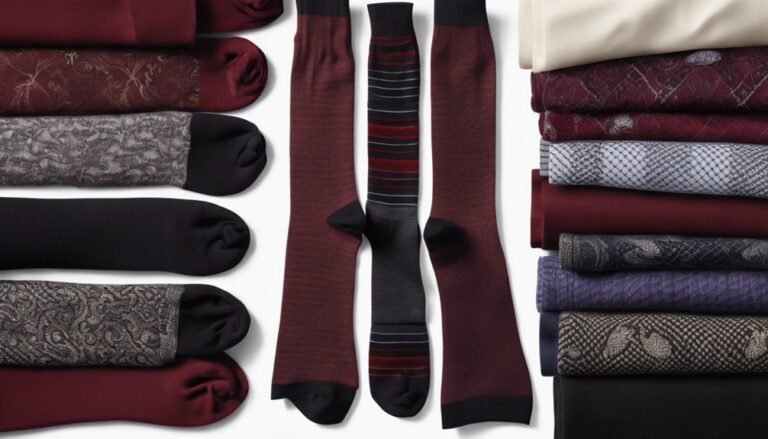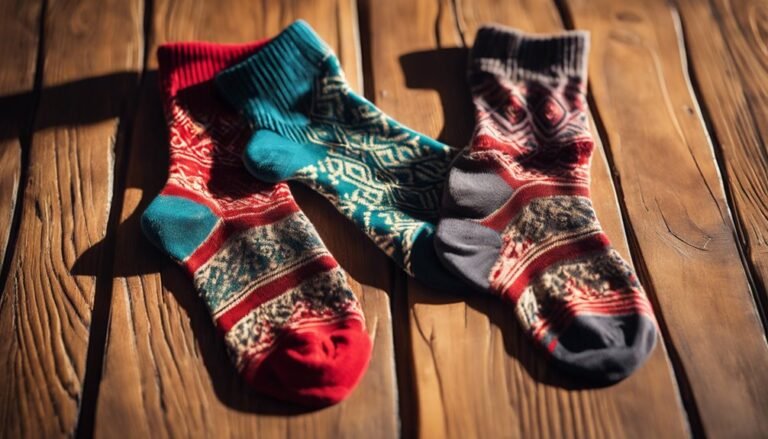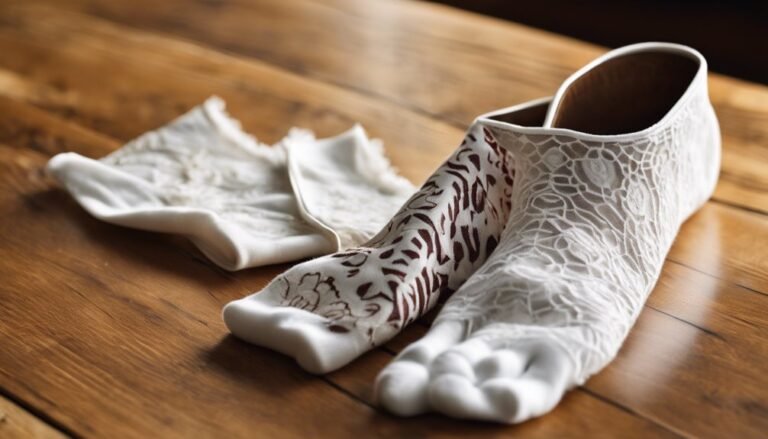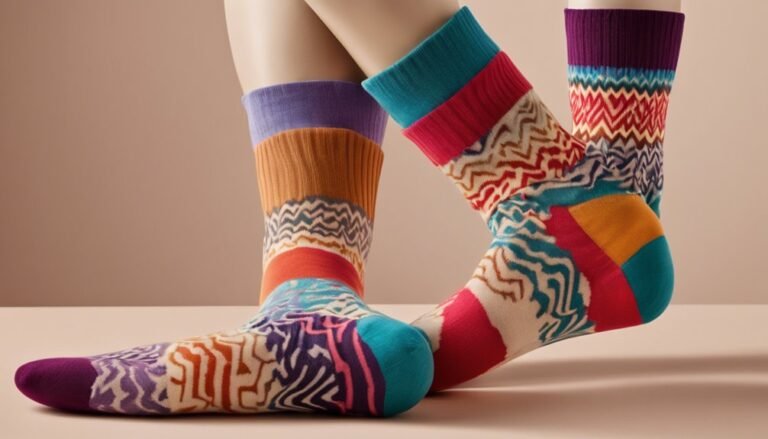Wool Socks vs. Vegan-Friendly Socks: Which Is More Ethical?
When choosing between wool socks and vegan-friendly options, you need to evaluate various ethical aspects. Wool's origins relate to farming practices that vary in animal welfare and environmental impact. While wool is biodegradable and durable, concerns about mulesing and intensive grazing exist. On the other hand, vegan socks made from plant-based fibers avoid animal cruelty but have their own environmental footprint. Assessing comfort and ethics can be complex, and understanding these factors can help you make informed choices.
The Origins of Wool: Understanding Sheep Farming

Although many people appreciate the warmth and comfort of wool socks, understanding their origins involves delving into the practices of sheep farming. Different sheep breeds, such as Merino and Suffolk, are selected for their unique wool characteristics, influencing the quality and texture of the final product. Farming practices vary widely, from small family-run operations to larger commercial farms, each with its own approach to animal welfare and sustainability. Ethical sheep farming prioritizes the well-being of the animals, ensuring they have adequate space, proper nutrition, and humane treatment. By recognizing these practices, you can make more informed choices about the wool products you choose, balancing comfort with your values. Understanding these foundations is essential for anyone seeking to engage thoughtfully with their purchasing decisions.
The Environmental Footprint of Wool Production
When considering the environmental footprint of wool production, it's essential to examine both the benefits and drawbacks associated with this natural fiber. On one hand, wool is biodegradable and offers a renewable resource. However, the environmental costs can be significant. High water usage is often required for sheep farming, which strains local ecosystems and can lead to water scarcity in some regions. Additionally, intensive grazing can contribute to land degradation, stripping away vegetation and affecting soil health. While wool has its advantages, these environmental impacts raise important questions about sustainability. You'll want to weigh these factors carefully when deciding whether to choose wool socks or explore more eco-friendly alternatives. Your choice can reflect your values and desire for a greener planet.
Animal Welfare Concerns in Wool Harvesting
As you reflect on the choice between wool socks and vegan-friendly alternatives, it is crucial to recognize the animal welfare concerns associated with wool harvesting. While many sheep are raised ethically, there are significant issues that can arise during sheep shearing and beyond. Here are some key points to ponder:
- Mulesing: This painful procedure is sometimes performed on sheep to prevent flystrike, raising serious animal rights concerns.
- Shearing Stress: Improper techniques can cause distress and injury to the animals.
- Living Conditions: Some farms may not provide adequate shelter or care for their sheep.
- End of Life: The fate of sheep post-productive life can lead to inhumane treatment.
Understanding these factors can guide your decision on which type of socks aligns with your values.
Vegan-Friendly Socks: Materials and Sources

While the ethical implications of wool harvesting prompt many to seek alternatives, vegan-friendly socks offer a variety of materials that align with compassionate consumer choices. These socks often utilize plant-based fibers like organic cotton, bamboo, or hemp, which provide comfort without compromising animal welfare. When choosing vegan socks, it's essential to take into account ethical sourcing practices. Look for brands committed to sustainable production methods that guarantee fair labor practices and minimal environmental impact. By prioritizing these materials, you not only support cruelty-free fashion but also contribute to a more responsible textile industry. With numerous options available, you can find stylish vegan-friendly socks that meet your values and keep your conscience clear while enjoying cozy comfort.
The Environmental Impact of Synthetic and Plant-Based Fabrics
Although the debate over fabric choice often centers on comfort and style, the environmental impact of synthetic and plant-based fabrics is equally essential to contemplate. When considering your sock options, think about the following:
- Synthetic Pollution: Manufacturing synthetic fabrics contributes to pollution, releasing microplastics into waterways.
- Energy Use: Production of synthetic materials often requires fossil fuels, increasing carbon footprints.
- Plant-Based Sustainability: Natural fibers tend to be biodegradable, promoting a circular economy.
- Water Consumption: Some plant-based fabrics can demand significant water resources, impacting local ecosystems.
Longevity and Durability: Wool vs. Vegan-Friendly Options
When it comes to longevity and durability, wool socks often outperform their vegan-friendly counterparts. Wool's natural fibers provide exceptional resilience, allowing them to withstand wear and tear much better than many synthetic or plant-based materials. This superior material longevity means you might find yourself replacing vegan-friendly socks more frequently, impacting your overall sustainability standards. While some vegan options are designed to be durable, they often can't match the inherent strength of wool. Plus, the production processes for some vegan materials can carry their own environmental footprint. In choosing between the two, consider not just the initial purchase but the long-term value and impact on your wardrobe's sustainability. Ultimately, the choice reflects your values and commitment to ethical consumption.
Ethical Consumption: Making Informed Choices

The choice between wool and vegan-friendly socks goes beyond just material quality; it touches on broader themes of ethical consumption and the values that guide our purchasing decisions. To navigate this landscape, you'll want to reflect on several factors that embody ethical consumerism and help you make informed choices:
- Source of Materials: Where do the wool or synthetic fibers come from?
- Production Practices: Are the manufacturers following fair labor practices?
- Environmental Impact: How do the production processes affect the planet?
- Animal Welfare: What are the implications for animal rights in wool production versus synthetic alternatives?
Balancing Comfort and Ethics in Sock Selection
While comfort is a significant factor in sock selection, it shouldn't overshadow the ethical considerations that accompany your choices. You might find yourself facing ethical dilemmas when deciding between wool and vegan-friendly options. Wool can provide unmatched warmth and comfort, but its production raises animal welfare concerns. On the other hand, vegan-friendly socks often prioritize sustainability but may not meet everyone's comfort preferences. It's crucial to strike a balance, understanding that your feet deserve both comfort and a clear conscience. Consider the materials, sourcing practices, and overall impact of your choices. By thoughtfully weighing comfort against ethics, you empower yourself to make an informed decision that aligns with your values and lifestyle, ensuring your sock drawer reflects who you truly are.
Frequently Asked Questions
Are All Wool Socks Produced Using Ethical Farming Practices?
When you ponder wool's warmth, remember not all wool socks come from ethical farming. While some producers prioritize humane practices, others may exploit animals in wool production. It's crucial to research brands before making choices.
What Are the Best Vegan-Friendly Materials for Socks?
When considering vegan-friendly materials for socks, organic cotton and bamboo fibers stand out. Both options offer comfort and breathability, with organic cotton being sustainable and bamboo fibers providing natural moisture-wicking properties, ensuring your feet stay happy.
How Do I Properly Care for Wool Socks?
You might think caring for wool socks is tricky, but it's not! Just use gentle sock washing methods, like cold water, and avoid direct heat when drying. Your socks will stay cozy and last longer!
Do Vegan-Friendly Socks Provide the Same Warmth as Wool?
When considering warmth comparison, wool generally offers superior insulation effectiveness due to its natural fibers. However, many vegan-friendly options use advanced materials that can provide comparable warmth, depending on their construction and weight. It's worth exploring!
Can I Find Wool Socks That Are Also Cruelty-Free?
Yes, you can find wool socks that are cruelty-free. Look for brands with cruelty-free certifications and sustainable sourcing practices. These options guarantee ethical treatment of sheep while providing the warmth and comfort you seek.







